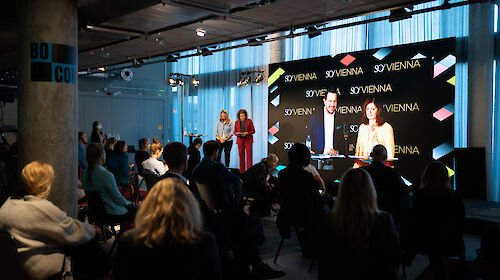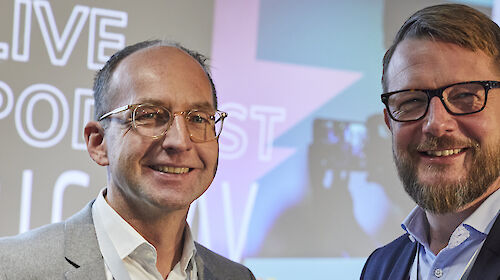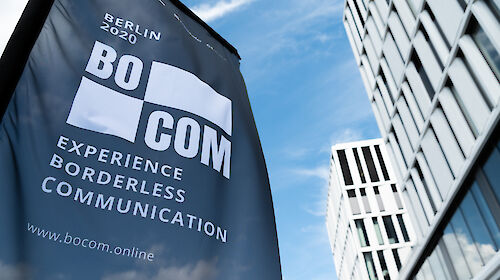“We should pay closer attention to the gaming industry”
GCB FutureTalks #18 with Anja Osswald, Managing Director of PHOCUS BRAND CONTACT
 © Anja Osswald / PHOCUS BRAND CONTACT
© Anja Osswald / PHOCUS BRAND CONTACT
Anja Osswald is the Managing Director of the event agency PHOCUS BRAND CONTACT as well as the publisher of the Beyond Realities study. Through her work she has dealt with virtual event formats and elements from an early stage. She has recently shared her experiences and an outlook on virtual and hybrid event formats with Matthias Schultze, Managing Director of the GCB.
The conversation also offered valuable insights into the development of future event concepts, the importance of interdisciplinary exchange and the role of the future-oriented gaming industry, among other things. One thing has become very clear: future event concepts and technology must always be adapted to the event’s participants – otherwise planners may risk overwhelming their participants.
Matthias Schultze: I am glad that we have a little time to talk about augmented, virtual and mixed reality. You described it so beautifully in your study by titling it "Beyond Realities". Can you tell us a little bit about it?
Anja Osswald: The study's aim was to question whether the actual application of these new technologies really justifies the current hype. In the past, we were able to realize great projects with our clients, but yet these events were not always able to fully live up to the expectations. That is why we asked ourselves whether the technology was already in place to create new experiences and immersion as we would imagine it in brand experience.
It is obvious that the new technologies still have their weaknesses and due to a lack of hardware, we are unable to digitally provide the unique selling points of events, meetings and congresses - the group experience. Therefore, we conducted surveys in various focus groups and organized several expert discussions with the aim of capturing the status quo of these new technologies.
Personal exchange has always played a key role and has been a major motivation for event participants. How can AR and VR events replace or amplify this experience?
When talking about events or live communication, we were always confronted with physical walls and boundaries. However, Extended Reality Formats remove these boundaries and we can create experiences in an open space or on blank canvas so to say. This puts the participant's experience at the center of attention.
After more than 20 years in the event management industry I have to say: I am missing an extra dimension. We are seeing a lack of possibilities to dream, to fly away and to trigger real enthusiasm. That is what's needed to bring about lasting change. And that is exactly what these technologies can enable. Nonetheless, to me it is also clear that analogue formats will not be replaced and can only be supplemented. We need the emotions of personal encounters paired with opportunities to break down spatial boundaries.
We are currently living and working in transition: we grew up in analogue times and are in the process of learning about and transitioning into virtual worlds. Of course, this transition also comes with great responsibility, because whenever somebody is trying something new, they also have to ensure that a proper implementation can be made possible for everyone involved. What role must event organizers and technology providers play in this?
I do believe that we carry a great responsibility in this regard. We must realize that we will not be able to turn back time and that it is senseless to demonize the new technologies. Ultimately it is up to us to give them value and define their future use. Four or five years ago, for example, we created 360-degree experiences for the first time. However, topics such as motion sickness or the clarification between reality and vision reminded us of our responsibilities when co-designing such experiences. Obviously, this responsibility also lies with all other parties involved.
At the same time, we are constantly being shown our limits and are realizing that we cannot simply transfer all analogue formats into the virtual sphere. In order to fully enable and experience immersion, our brains must first get used to it. This is a slow process, but it is our responsibility to support it, nonetheless.
That means we must learn to reconsider and cannot simply transfer analogue experiences into the virtual world. Ulrike Tondorf from Bayer AG recently gave us valuable insights into the conception of virtual events. In fact, she believes that our definition of an event's conception will undergo great change. What do you think about this and what skills be needed to enable good event conception in the future?
I believe that the most important scientific discipline - actually I negated this for a long time - will actually be brain research. We must ask ourselves: How does our thinking actually work? And what can our brain perceive? When motion pictures were first introduced, people left the theatres screaming. And we are currently facing similar challenges. If we really want to understand how our brain perceives experiences, then we must deal with interdisciplinary sciences and really delve into them.
A few years ago, for example, we implemented a 7D cinema for one of our clients. In the beginning most participants looked around and appreciated this new format. However, it did not take long until they started looking straight ahead and continued doing so until the end of the presentation. This is, after all, what we have learned growing up. This experience has shown me that we cannot simply confront our audiences with the newest technologies. Instead, we must take our time and introduce them to new formats step by step. We have not yet found the perfect solution for this, but I believe that we have an exciting future ahead of us.
It will probably take at least another three to five years to really understand these processes though. In this respect, we should actually pay closer attention to the gaming industry, which was opinion leader five years ago and is now leading us into the new, unknown world. And on top of that, we also need a lot of patience. I am still struggling with this, but if we want to inspire the masses, we will have to be patient.
Impatience can be an important driving force - especially in times of crisis. That is why I am grateful that you have dealt with these matters in a concrete way and did not just stop at a theoretical level. The American marketing guru Simon Sinek likes to focus on the "reason why" and the purpose of things. Where do you see the use of new technologies in the context of live communication and what is its "reason why"? What changes do you expect in this regard in the future?
That is a very exciting question and it certainly is not an easy to answer. When people question their own actions or their own company, they quickly realize how difficult it is to define their "reason why". We found our "reason why" two or three years ago and it works - thank God - in both the analogue and the digital spheres.
All of our actions are about generating enthusiasm for a better future and we believe, that both analogue and digital formats will be necessary to accomplish this. One aspect where we often see difficulties - and sometimes even lose clients - is when we refrain from using certain technologies just because they are available. Once we start making the purpose our priority, we will have to find ways to inspire people. All it takes is a small thought, which can be sparked by events, trade fairs or discussions. And that is where new technologies can help immensely. They can help us expand our horizons and can enable entirely new experiences. Limiting yourself to analogue formats may do the contrary.
On the other hand, we are not getting any younger and are becoming more and more entrenched over time and now, out of a sudden, new technologies are opening up a whole new dimension. This creates the need for reflection, but again: This is exactly what these technologies have been created for. Nonetheless, we must be clear about what purpose we want to pursue and what reactions we are aiming for. And then we will have a lot of fun.
You have now found your purpose, but what does your vision for future trade fair live communication look like?
I firmly believe in a very boring wisdom: the human desire for encounter will never end. In fact, this is probably the only reason why trade fairs are still around. People can access all the information they are looking for online, but personal encounter - the buzzing in the air, the spontaneous meeting or drinking coffee together - will continue to be irreplaceable. At the trade fair of the future, all participants, worldwide, will get to decide for themselves how they want to consume information and how they want to meet other participants.
That is why I have one straightforward advice for all clients: Please stop thinking in terms of "either or". From now on it will always be an "and". The question of creating a virtual platform should not only come up once a face-to-face event has been cancelled. Instead, we must focus on how we can provide added value for all of our participants. This can only be created through a multiple level approach and is not limited to the event itself. We must also create ways to enable dialogues with participants prior, during and after the event - both face-to-face and virtually.
And of course, people will continue coming to events, because personal exchange makes these experiences irreplaceable. For this reason, future trade fairs will always offer a great mix. This may not always go down well with the customers, but I believe that this double investment will be necessary in the next five to ten years.
 ©
© ©
© ©
©